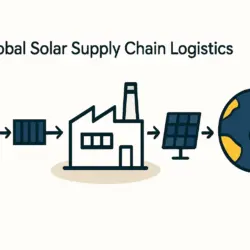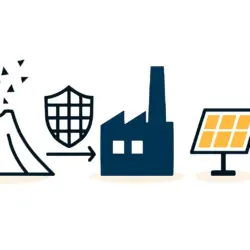Iceland’s Renewable Energy Landscape: A Transformation Towards Sustainability
Iceland’s energy landscape is on the cusp of a remarkable transformation, with the anticipated closure of its only coal-fired power plant by 2026. This move is a cornerstone of Iceland’s broader commitment to renewable energy, as the nation sets its sights on eliminating fossil fuel usage by 2030 and achieving carbon neutrality by 2040. For anyone asking ‘does Iceland use fossil fuels?’, this decision marks a definitive step towards a resounding ‘no’.
The Straumsvík coal-fired power plant, operated by HS Orka, has been a vital part of Iceland’s energy infrastructure for over two decades. Its closure, however, marks a pivotal step in the country’s journey towards a sustainable energy future. HS Orka’s CEO, Tómas Már Sigurðsson, called the plant a ‘relic of a fossil fuel era,’ emphasizing that its decommissioning is essential for meeting Iceland’s climate objectives.
Economic and Environmental Drivers of Iceland’s Renewable Energy Shift
The plant’s closure is driven by both economic and environmental factors. HS Orka’s decision to decommission the plant by 2026 aligns with the company’s strategy to transition towards greener, more sustainable energy solutions. The company is actively exploring alternative energy sources, including geothermal power and biofuels, to compensate for the lost capacity from the coal plant.
Iceland’s energy sector already relies heavily on renewable sources. Hydropower and geothermal power currently account for the majority of the country’s energy production, with geothermal energy serving as the primary source of heating for Icelandic homes. The closure of the coal-fired power plant will further reduce Iceland’s dependence on fossil fuels and accelerate its transition to a fully renewable energy system.
Addressing Energy Security and Grid Stability with Iceland’s Renewable Energy
Despite Iceland’s abundant renewable energy resources, closing the coal plant raises concerns about energy security and grid stability. The plant has historically served as a backup power source during periods of high demand, particularly in the cold winter months.
To address these concerns and maintain grid stability with renewables, HS Orka is considering the construction of a new backup power plant fueled by biofuels. This new facility would provide a reliable source of power during peak demand, ensuring Iceland’s energy grid remains stable and secure.
The shift from coal to biofuels is part of a broader trend in Iceland’s energy policy. The government has set ambitious targets to reduce greenhouse gas emissions, with a specific goal of eliminating fossil fuel use by 2030. As part of this initiative, Iceland is investing in biofuels and other renewable energy technologies to replace fossil fuels in transportation and other sectors.
Iceland’s Renewable Energy and Commitment to International Climate Goals
Iceland’s commitment to renewable energy is also reflected in its international climate goals. The country has pledged to achieve carbon neutrality by 2040, a target that would make it one of the first nations in the world to reach this milestone. Shutting down the coal-fired power plant is a significant step toward this goal, as it will eliminate a major source of the country’s greenhouse gas emissions.
The transition to a fully renewable energy system in Iceland is not without its challenges. Continued investment in new technologies and infrastructure is essential to ensure the country’s energy grid remains reliable and resilient. However, the closure of the coal-fired power plant is a clear indication of Iceland’s determination to lead the global fight against climate change.
Iceland’s decision to close its coal-fired power plant by 2026 is a significant milestone in the nation’s journey toward renewable energy. By eliminating one of its last remaining sources of fossil fuel emissions, Iceland moves closer to its goal of achieving carbon neutrality by 2040. The shift towards biofuels and other renewable energy sources will help ensure that Iceland’s energy system remains sustainable and resilient for future generations.
For more insights into Iceland’s renewable energy initiatives, including solar panel subsidies for remote areas, visit PVKnowhow.



